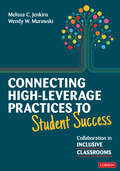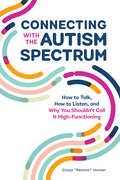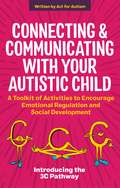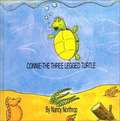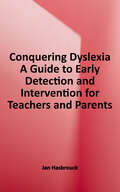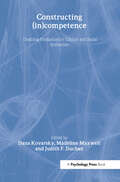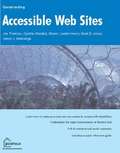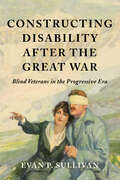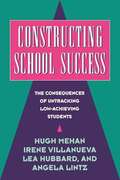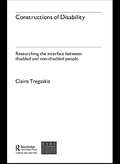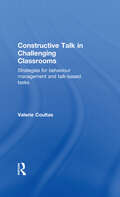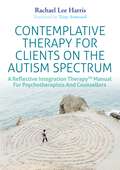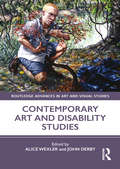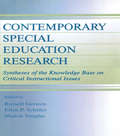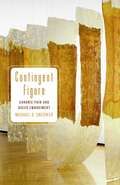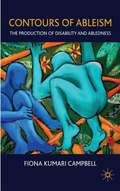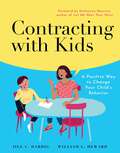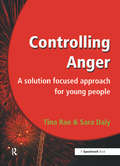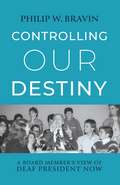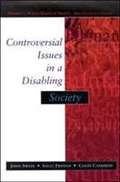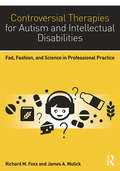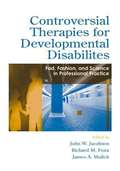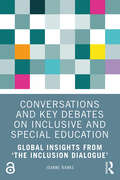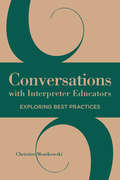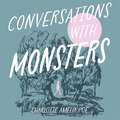- Table View
- List View
Connecting High-Leverage Practices to Student Success: Collaboration in Inclusive Classrooms (The\norton Series On Inclusive Education For Students With Disabilities Ser. #0)
by Wendy Murawski Melissa JenkinsTransform classrooms and student performance with evidence-based, effective practices Two brains are better than one, as the saying goes, and this is especially true in education. Educators who employ effective collaboration and co-teaching greatly amplify student engagement, achievement, and growth, particularly for those learners needing extra support. Written by two of the nation’s top experts in co-teaching, Connecting High-Leverage Practices to Student Success is an essential, reader-friendly guide for educators and instructional leaders who are passionate about creating truly inclusive classrooms where all students thrive— academically, behaviorally, socially, and emotionally. Inside, authors Melissa Jenkins and Wendy Murawski provide: Three clearly defined steps to build a strong foundation, leverage collaboration, and support students’ growth A laser focus on high-leverage and evidence-based practices for general and special education that optimize educators’ impact, including collaboration, instruction, assessment, and social emotional/behavior skills Seamless integration of practices within MTSS and RTI processes to meet the needs of all learners Countless and concrete samples, examples, tools, reflection exercises, and supplemental materials that enable you to move from theory to immediate instructional practice Positioning collaboration as the catalyst to maximizing high-leverage and evidence-based practices for the success of all students, this easy-to-use handbook belongs on the desk of every teacher working toward a truly inclusive environment.
Connecting With The Autism Spectrum: How To Talk, How To Listen, And Why You Shouldn't Call It High-Functioning
by Casey "Remrov" VormerThe complete guide to connecting with adults on the autism spectrum - one of the 2021 Best Books on Autism from ChoosingTherapy.comFor a friend, family member, or coworker with autism, communication can be challenging. But Connecting with the Autism Spectrum can help you find common ground with expert tips and helpful insights about talking (and listening) to neurodiverse adults so you can make your interactions more transparent, meaningful, and rewarding for all.Written by Casey Vormer, a self-taught artist and autism advocate, this comprehensive guide is a trusted source for understanding neurodiversity that features a brief introduction to the autism spectrum. It also provides easy communication strategies like active listening and positive encouragement as well as steps to avoid misunderstandings by teaching how to recognize biases and correct them. Additionally, you'll learn why the term "high functioning autism" is a misnomer to define members of this vibrant community."It's important to look at every autistic person individually and recognize their obstacles—but more importantly, we should acknowledge their skills and avoid labeling them with 'high functioning autism' or 'low functioning autism' altogether," Vormer says.Unlike other autism books, Connecting with the Autism Spectrum delivers:An easy approach—Discover the best ways to communicate with those living with autism.Situational success—Find the right information for various situations and settings, including school, work, and social relationships.A sensitive tone—Get valuable information from a clear, honest point of view that does not seek to "cure" or manipulate people.Learn how to communicate better with those on the autism spectrum with this informative book.
Connecting and Communicating with Your Autistic Child: A Toolkit of Activities to Encourage Emotional Regulation and Social Development
by Tessa Morton Jane GurnettThis book teaches drama and immersive theatre-based activities for parents and professionals working with children and young people on the autism spectrum. The exercises follow the author's simple, person-centred '3C pathway' of connecting, calming and communicating, and enable parents to gain an understanding of the challenges an autistic child may face by 'walking in their shoes', while empowering children to become more self-aware and express themselves in healthy ways. The activities included in the book are tried-and-tested, accessible and easy to implement, such as breathing exercises, mirroring movements, and treasure hunts. Using these activities, parents and professionals can gain insight into the sensory and social challenges experienced by those on the spectrum and can work to build a positive and trusting relationship, offering a secure base for children's emotional development.
Connie: The Three Legged Turtle
by Nancy NorthropConnie, a turtle with only three legs, teaches readers that the best thing they can do is always do their best even when it isn't easy or fun. Connie proves herself as a Handi and Abled friend saving the day in a terrible storm. And she does it with only three legs.
Conquering Dyslexia: A Guide to Early Detection and Intervention for Teachers and Parents
by Jan HasbrouckDyslexia is no longer a mystery. MRI scans and other tools of neuroscience have advanced our understandings in the last decade. We now know what to do to help students become skilled, confident learners. In Conquering Dyslexia, Dr. Hasbrouck shares the instructional approaches that work best for children who have this disorder, and the most current information for parents so they can advocate for their children and communicate with educators effectively. This book addresses: - What is dyslexia? - How to identify it - Early diagnosis and intervention - Teaching students - Supporting English Learners PRAISE FOR CONQUERING DYSLEXIA A thoroughly practical book that translates the science of reading and what we know about dyslexia into practice. A must-read for teachers, practitioners, administrators, and others on the frontline of teaching all children to read. Jack M. Fletcher, Ph.D., ABPP (ABCN) Hugh Roy and Lillie Cranz Cullen Distinguished Professor University of Houston
Constructing (in)competence: Disabling Evaluations in Clinical and Social interaction
by Judith Felson Duchan Dana Kovarsky Madeline MaxwellCompetence and incompetence are constructs that emerge in the social milieu of everyday life. Individuals are continually making and revising judgments about each other's abilities as they interact. The flexible, situated view of competence conveyed by the research of the authors in this volume is a departure from the way that competence is usually thought about in the fields of communication disabilities and education. In the social constructivist view, competence is not a fixed mass, residing within an individual, or a fixed judgment, defined externally. Rather, it is variable, sensitive to what is going on in the here and now, and coconstructed by those present. Constructions of competence are tied to evaluations implicit in the communication of the participants as well as to explicit evaluations of how things are going. The authors address the social construction of competence in a variety of situations: engaging in therapy for communication and other disorders, working and living with people with disabilities, speaking a second language, living with deafness, and giving and receiving instruction. Their studies focus on adults and children, including those with disabilities (aphasia, traumatic brain injury, augmentative systems users), as they go about managing their lives and identities. They examine the all-important context in which participants make competence judgments, assess the impact of implicit judgments and formal diagnoses, and look at the types of evaluations made during interaction. This book makes an argument all helping professionals need to hear: institutional, clinical, and social practices promoting judgments must be changed to practices that are more positive and empowering.
Constructing Accessible Web Sites
by Paul Bohman Jim Thatcher Cynthia Waddell Shawn Henry Sarah Swierenga Mark Urban Michael BurksA guide to the whys and hows of creating web accessible websites.
Constructing Disability after the Great War: Blind Veterans in the Progressive Era (Disability Histories)
by Evan P. SullivanAs Americans--both civilians and veterans--worked to determine the meanings of identity for blind veterans of World War I, they bound cultural constructs of blindness to all the emotions and contingencies of mobilizing and fighting the war, and healing from its traumas. Sighted Americans’ wartime rehabilitation culture centered blind soldiers and veterans in a mix of inspirational stories. Veterans worked to become productive members of society even as ableism confined their unique life experiences to a collection of cultural tropes that suggested they were either downcast wrecks of their former selves or were morally superior and relatively flawless as they overcame their disabilities and triumphantly journeyed toward successful citizenship. Sullivan investigates the rich lives of blind soldiers and veterans and their families to reveal how they confronted barriers, gained an education, earned a living, and managed their self-image while continually exposed to the public’s scrutiny of their success and failures.
Constructing School Success: The Consequences of Untracking Low Achieving Students
by Angela Lintz Lea Hubbard Irene Villanueva Hugh MehanBolstering the academic success of low achieving students and providing a more egalitarian classroom setting are two constant challenges to our schools. This book describes the process of "untracking", an educational reform effort that has prepared students from low income, linguistic and ethnic minority backgrounds for college. Untracking offers all students the same academically-demanding curriculum while varying the amount of institutional support they receive. This book is a highly readable account of a successful school reform effort. It provides systematic research results concerning the educational and social consequences of untracking previously low achieving students, and will be of great importance to researchers in educational and social psychology.
Constructions of Disability: Researching Inclusion in Community Leisure
by Claire TregaskisThis innovative book discusses the meaning of 'inclusion' through the exploration of the interactions between disabled and non-disabled people at a community leisure centre. By exploring the nature of this interface, an understanding of how people create potential for both disability and inclusion is revealed. This book takes a very different approach to that of existing texts, which have tended to concentrate mainly on disabled people's exclusion. The advantage of this new approach is that it adds an extra dimension to our understanding of how discriminatory practice is variously perpetuated and challenged..Constructions of Disability is valuable reading for all people who are working towards increased social inclusion for disabled people, including theorists and students of disability studies and learning difficulty, leisure management and disability service providers, and their families. Using a practical case study approach, it explores the impact that social interaction between disabled and non-disabled people can have increasing or decreasing disabled people's opportunities for inclusion. Examples of both inclusive and discriminatory practice are described in detail, and the positive and negative effects of these actions on the participants are demonstrated and discussed. This insightful book offers a wide range of practical suggestions for the future development of more inclusive theory, policy and practice.
Constructive Talk in Challenging Classrooms: Strategies for Behaviour Management and Talk-Based Tasks
by Valerie CoultasConstructive Talk in Challenging Classrooms gives the practising teacher advice on how to make learning fun through the use of ‘talk’ and collaborative group work. Using clear examples, tried and tested in some of the most challenging classrooms in inner city schools, the book offers practical and honest advice on both the difficulties and rewards that can be gained when employing all forms of talk-based teaching in the classroom. Packed with real examples of successful talk based lessons with children of all abilities and needs, this book will show teachers how they can succeed in overcoming problems of disruption and engage even the most difficult pupils in real learning through talk. The book shows that bringing the child's individual experience into a lesson through talk has huge emotional and psychological benefits – this can be particularly marked in classrooms where there are low levels of literacy, behaviour issues or where pupils’ first language is not English. The author argues that talk is vital for building positive relationships and essential for successful teaching, particularly in the difficult classrooms. This inspiring title is essential reading for any teacher interested in building trust and making learning fun and meaningful for all.
Contemplative Therapy for Clients on the Autism Spectrum: A Reflective Integration Therapy™ Manual for Psychotherapists and Counsellors
by Tony Attwood Rachael Lee HarrisDrawing on the ancient tradition of contemplation, Reflective Integration Therapy™ shows how mantra meditation and reflective therapy can be used with clients with high functioning autism. The Reflective Integration Therapy™ programme uses the cognitive differences in those with autism, such as their innate capacity for silence, withdrawal, intense focus and repetition as sources of therapeutic healing. This manual introduces this fresh, unique therapeutic approach, creating an essential resource for all practitioners working in the field of autism. All the material for twelve weekly sessions of therapy is included within the book.
Contemporary Art and Disability Studies (Routledge Advances in Art and Visual Studies)
by Alice Wexler John DerbyThis book presents interdisciplinary scholarship on art and visual culture that explores disability in terms of lived experience. It will expand critical disability studies scholarship on representation and embodiment, which is theoretically rich, but lacking in attention to art. It is organized in five thematic parts: methodologies of access, agency, and ethics in cultural institutions; the politics and ethics of collaboration; embodied representations of artists with disabilities in the visual and performing arts; negotiating the outsider art label; and first-person reflections on disability and artmaking. This volume will be of interest to scholars who study disability studies, art history, art education, gender studies, museum studies, and visual culture.
Contemporary Special Education Research: Syntheses of the Knowledge Base on Critical Instructional Issues (The LEA Series on Special Education and Disability)
by Sharon Vaughn Russell Gersten Ellen P. SchillerConsiderable research in the past 30 years has accumulated regarding the academic and social functioning of youngsters with disabilities. Only in the past decade has there been sufficient special education research published from which meta-analyses and syntheses can be conducted. In this volume, seven sets of authors grapple with synthesizing the knowledge base on an array of critical topics in the field of special education. Among others, specific chapters include: * a synthesis of what is known about effective instructional grouping practices for reading. * an examination of the differences between students classified as learning disabled and other low-achieving students on a range of academic performance measures. * a review of effective instruction for English-language learners. * an examination of the research on behavioral supports for low-incidence special education populations. * a synthesis on how technology supports literary development, across the full spectrum of disabilities categories. These papers provide up-to-date, informative summaries of current knowledge and a base from which further venture into the critical area of instructional intervention in special education can occur.
Contingent Figure: Chronic Pain and Queer Embodiment
by Michael D. SnedikerA masterful synthesis of literary readings and poetic reflections, making profound contributions to our understanding of chronic painAt the intersection of queer theory and disability studies, acclaimed theorist Michael D. Snediker locates something unexpected: chronic pain. Starting from this paradigm-shifting insight, Snediker elaborates a bracing examination of the phenomenological peculiarity of disability, articulating a complex idiom of figuration as the lived substance of pain&’s quotidian. This lexicon helps us differently inhabit both the theoretical and phenomenal dimensions of chronic pain and suffering by illuminating where these modes are least distinguishable. Suffused with fastidious close readings, and girded by a remarkably complex understanding of phenomenal experience, Contingent Figure resides in the overlap between literary theory and lyric experiment. Snediker grounds his exploration of disability and chronic pain in dazzling close readings of Herman Melville, Emily Dickinson, Henry James, and many others. Its juxtaposition of these readings with candid autobiographical accounts makes Contingent Figure an exemplary instance of literary theory as a practice of lyric attention.Thoroughly rigorous and anything but predictable, this stirring inquiry leaves the reader with a rich critical vocabulary indebted to the likes of Maurice Blanchot, Gilles Deleuze, D. O. Winnicott, and Eve Kosofsky Sedgwick. A master class in close reading&’s inseparability from the urgency of lived experience, this book is essential for students and scholars of disability studies, queer theory, formalism, aesthetics, and the radical challenge of Emersonian poetics across the long American nineteenth century.
Contours of Ableism: The Production of Disability and Abledness
by Fiona Kumari CampbellExamining what the study of disability tells us about the production, operation and maintenance of ableism, this ambitious study explores the ways abledness is understood. It provides new directions in research on 'aberrancy' and its focus on a normative ethos. Reconfiguring, challenging and extending the boundaries of a disability studies perspective, Contours of Ableism explores territories of ableism in the themes of embodiment, subjectivity, transhumanism, technologies and jurisprudence.
Contracting with Kids: A Positive Way to Change Your Child's Behavior
by William L. Heward Jill C. Dardig"Colorful and easy to implement, this book will be a resource for parents and guardians looking to try behavior contracting in their homes." —Library Journal When a child is struggling with a behavior challenge or wants to learn a new skill, a contract can be a surprisingly effective solution that leads to more peaceful family dynamics. To help families create contracts as a collaborative process, Contracting with Kids offers an innovative combination of how-to text for parents and illustrated stories for children. Contracting with Kids describes a straightforward, four-step solution called behavioral contracting, a research-based technique with proven real-world success. Contracts are a tool that can benefit anyone, but they&’re particularly useful for: Autistic children Children with learning or developmental disabilities Children who benefit from clear expectations and receiving positive feedback and rewards The book&’s beautifully illustrated stories show a diverse group of families using contracts to address common problems such as: Completing chores or homework Getting along with siblings Becoming independent Achieving personal goals Questions after each story are designed to spark age-appropriate discussions. Sample contracting forms and supporting materials are provided in the book and also on a companion website.
Controlling Anger: A Solution Focused Approach for Young People
by Sara Daly Tina RaeMany pupils experience difficulty in controlling their strong feelings and in managing conflict in both school and home settings. This programme aims to help young people: * avoid or manage situations of conflict * understand that they can create change * realise that it is possible to resolve difficulties and achieve a positive outcome. In this thoughtful approach to anger management, the authors suggest a teaching and learning model and use 'story' as the focus of pupil engagement. The book uses eight newspaper articles to help pupils to develop emotional literacy through subjects such as: * Road rage * racist incidents * Happy slapping * street fights. During the 10 session programme young people will: * understand anger in a variety of situations * learn about physiological and behavioural aspects of anger * rehearse coping strategies * plan positive responses to provocative situations. This book offers teachers and non-teaching staff a practical, exciting and well-designed resource with full facilitator notes and all handout materials printable from the downloadable resources.
Controlling Our Destiny: A Board Member’s View of Deaf President Now
by Philip W. BravinIn March 1988, students at Gallaudet University led a successful protest to demand the selection of the university’s first deaf president. The Deaf President Now (DPN) movement was a watershed event in American deaf history; it achieved self-governance for the deaf community and placed Gallaudet in the center of a national media spotlight. Controlling Our Destiny is Philip Bravin’s personal perspective of these momentous events. A lifelong member of the deaf community and proud Gallaudet alumnus, Bravin was a member of the Gallaudet University Board of Trustees and the chair of the presidential search committee during DPN. Although the deaf community had been strongly advocating for a deaf president to lead the university, the board (which had a hearing majority) selected the lone hearing candidate. Bravin recounts the discussions and decision-making that happened behind the scenes leading up to and following the ill-fated announcement. He reflects on the integrity of the process and the internal conflict he experienced as a deaf person who supported a deaf president yet felt compelled to abide by his duties as a board member. After the protests, his leadership was recognized when he was selected as the first deaf chair of the board. Photographs and documents add depth to Bravin’s account, many of which will be seen by the public for the first time. I. King Jordan, the first deaf president of Gallaudet, provides a foreword in which he shares his own unique insight into these events. Controlling Our Destiny captures the energy and the urgency of DPN. Readers will understand the complexities of the presidential search process and the cultural and historical contexts that triggered the protest. Bravin’s memoir contemplates power, access, community, and the enduring legacy of a movement that inspired deaf people around the world.
Controversial Issues in a Disabling Society
by John Swain Sally French Colin CameronAt its best, Disability Studies is an arena of critical debate, addressing controversial issues concerning not just the meaning of disability, but the nature of society, dominant values, quality of life, and even the right to live.
Controversial Therapies for Autism and Intellectual Disabilities: Fad, Fashion, and Science in Professional Practice
by James A. Mulick Richard M. FoxxOne of the largest and most complex human services systems in history has evolved to address the needs of people with autism and intellectual disabilities, yet important questions remain for many professionals, administrators, and parents. What approaches to early intervention, education, treatment, therapy, and remediation really help those with autism and other intellectual disabilities improve their functioning and adaptation? Alternatively, what approaches represent wastes of time, effort, and resources? <p><p>Controversial Therapies for Autism and Intellectual Disabilities, 2nd Edition brings together leading behavioral scientists and practitioners to shed much-needed light on the major controversies surrounding these questions. Expert authors review the origins, perpetuation, and resistance to scrutiny of questionable practices, and offer a clear rationale for appraising the quality of various services. <p><p>The second edition of Controversial Therapies for Autism and Intellectual Disabilities has been fully revised and updated and includes entirely new chapters on psychology fads, why applied behavioral analysis is not a fad, rapid prompting, relationship therapies, the gluten-free, casein-free diet, evidence based practices, state government regulation of behavioral treatment, teaching ethics, and a parents' primer for autism treatments.
Controversial Therapies for Developmental Disabilities: Fad, Fashion, and Science in Professional Practice
by James A. Mulick Richard M. Foxx John W. JacobsonOne of the largest and most complex human services systems in Western nations has evolved to address the needs of people with developmental disabilities. In the U. S. , for example, school budgets are stretched thin by legally mandated special education, and billions of Medicaid dollars annually are consumed by residential and professional services to this population. The temptation of a quick fix is strong. Many parents desperately seek the latest ideas and place pressure on program administrators, who often are not trained to think critically about the evidence base for intervention efforts. The problems of people with developmental disabilities have historically been targeted by a wide range of professionals who rely on clinical experience and intuition and do not submit their claims to the tests of scientific research. Professional entrepreneurs have energetically promoted their treatments to a public perhaps too trustful of those with credentials. Thus, families and their children are buffeted by reforms founded on belief and ideologically driven management. Services fluctuate with the currents of social movements and rapidly shifting philosophies of care as policymakers and providers strive for increased responsiveness and individualization. These forces affect not only where and how, but how well people are served. Too often, services are less effective than they could be, or worse, damaging to personal growth and quality of life. Many treatments are based on poorly understood or even disproven approaches. What approaches to early intervention, education, therapy, and remediation really help those with mental retardation and developmental disabilities improve their functioning and adaptation? And what approaches represent wastes of time, effort, and resources? This book brings together leading behavioral scientists and practitioners to focus light on the major controversies surrounding these questions. The authors review the origins, perpetuation, and resistance to scrutiny of questionable practices, and offer a clear rationale for appraising the quality of services. In an era of increasing accountability, no one with a professional stake in services to individuals with mental retardation and developmental disabilities can afford not to read this book.
Conversations and Key Debates on Inclusive and Special Education: Global Insights from ‘The Inclusion Dialogue’
by Joanne BanksBased on the second series of the popular Inclusion Dialogue podcasts, Joanne Banks explores the tensions, debates and understandings of inclusive education in context of current policy changes. Featuring in-depth interviews with 12 world-renown academics, this book provides a comprehensive overview of the current tensions and conceptual understandings in the field.Delving further into diverse viewpoints around special education, and how mainstream education includes and excludes students, Banks broadens the discussions started in the first podcast series by highlighting nuanced alternative perspectives, national contexts and historical developments. Given the diversity of the authors themselves in terms of their geography, career stage and views on inclusive education, the chapters highlight key issues around how we theorise inclusive education, the diversity of views on how inclusion can be measured and the intersections between disability and other student characteristics such as socio-economic background, gender, ethnicity, race and sexuality. Using the informal interviews as its springboard, the book offers practical insights into universally designed pedagogies and the role of the school community in fostering inclusive education.This book is ideal for academics, researchers and educators working in inclusive and special education, who wish to create more inclusive environments for their students. It is also a key resource for policymakers seeking to understand inclusive education and address its manifestation in learning environments on ground.Chapter 5 of this book is freely available as a downloadable Open Access PDF at http://www.taylorfrancis.com under a Creative Commons Attribution (CC BY) 4.0 license.
Conversations with Interpreter Educators: Exploring Best Practices
by Christine MonikowskiSign language interpreter education is a relatively young field that is moving toward more theory-based and research-oriented approaches. The concept of sharing research, which is strongly encouraged in this academic community, inspired Christine Monikowski to develop a volume that collects and distills the best teaching practices of leading academics in the interpreting field. In Conversations with Interpreter Educators, Monikowski assembles a group of 17 professors in the field of sign language interpretation. Through individual interviews conducted via Skype, Monikowski engages them in informal conversations about their teaching experiences and the professional publications that have influenced their teaching philosophies. She guides each conversation by asking these experts to share a scholarly publication that they assign to their students. They discuss the merits of the text and its role in the classroom, which serves to highlight the varying goals each professor sets for students. The complexity of the interpreting task, self-reflection, critical thinking, linguistics, backchannel feedback, and cultural understanding are a sampling of topics explored in these exchanges. Engaging and accessible, Monikowski’s conversations offer evidence-based practices that will inform and inspire her fellow educators.
Conversations with Monsters: On Mortality, Creativity, And Neurodivergent Survival
by Charlotte Amelia PoeHow does autistic trauma really feel, and how can you find your way through it to a warmer, brighter place?Written by best-selling author Charlotte Amelia Poe this is a poignant and whimsical exploration of the true autistic experience. Chapter-by-chapter, Poe delicately peels back the layers of what it is to be young and autistic in the modern world, touching on trauma, grief, mortality, love and everything in between.Charming, thought-provoking and often very funny, this book doesn't offer solutions - it walks next to you, like a friend, through times both dark and light. It reminds you every step that you're not alone.
